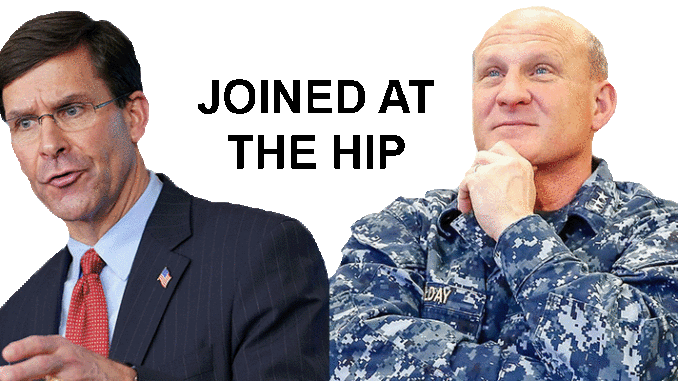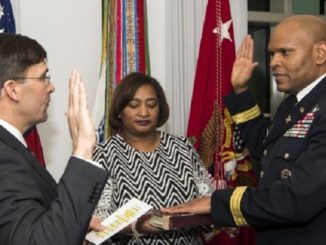
Where stupid policy and stupid decisions are concerned, the Secretary of Defense Mark Esper and CNO, Adm. Mike Gilday are JOINED AT THE HIP.
REVIEW
The COVID-19 virus began to sweep the world. Captain Brett Crozier was ordered to make a port call in Vietnam. The Captain expressed his deep concern that it would not be wise to make a port call until the full extent of the deadly COVID-19 virus was known.
His concerns were cast aside and he followed his orders, making a port call to Vietnam. Social distancing was the furthermost thing from the mind of 5,000 horny sailors. It wasn’t long before COVID-19 swept through the ship infecting many sailors. Capt. Crozier pleaded with his chain of command to put into Guam where hospital facilities could have dealt with the virus much more effectively.
Instead, the Navy with its pathetic leadership kept wringing their hands as the numbers of sick sailors on the USS Theodore Roosevelt dramatically rose. Sickbay may have had one or two ventilators aboard covered with dust, and we’ll bet that no one knew how to operate them.
Frustrated with the pathetic, non-existent leadership coming from his own chain of command, the Captain who had also contracted the disease, decided to email some people in the hope that he could bypass the normal chain of command and get his sailors the life-saving help they desperately needed.
When news of the sick crew of the USS Roosevelt hit the lame-stream news media, the Navy circled their destroyers, so to speak. The Navy leaked out a disinformation piece-of-crap saying Captain Brett Crozier emailed 20-30 people. We found out later it was closer to two to four.
The United States Navy was in the damage-control process of first vilifying Captain Brett Crozier before they lowered the boom. The Navy knows all to well, it’s an effective political tactic if properly implemented.
The ship was ultimately allowed to dock in Guam and Captain Crozier packed up his sea-bag after being fired by Navy Secretary Thomas Modly. He left the Roosevelt and his unhappy crew, sorry to see him go. To let him know he was admired and respected, the crew loudly chanted his name as he traversed down the officer’s brow off the ship.
As part of their damage control campaign, Secretary of the Navy Thomas Modly flew out to address the crew of the aircraft carrier, an alarming waste of money. It wasn’t a pretty sight. The Navy Secretary gave his Patton-style profanity laced speech, while the crew was flipping him the bird and heckling him throughout his profane speech.
Modly resigned on April 7, 2020, after controversy over his decision to oust Crozier was compounded by his trip to the carrier where he denounced the former captain to his crew. Audio recordings surfaced of Modly saying that Crozier was “too naive or too stupid” to lead the ship.
The American people tended to agree with the crew. Capt. Crozier was forced to walk the plank, simply because he was desperate to save the lives of his crew. So, the Navy does what it always does, they hunkered down, and waited in the weeds.
Being political animals, the Chief of Naval Operations (CNO), Mike Gilday, dropped the bomb last Friday that Captain Brett Crozier would not be reassigned as the commanding officer of the USS Roosevelt, nor will he be eligible for future command.
The CNO went on to say that Captain Crozier fell well short of what we (in the Navy) expect of those in command. Unfortunately, he failed to apply the same standard to himself of those in Captain Crozier’s chain of command.
Adm. Gilday tended to diminish the emails Crozier sent out and focused on what he felt was Corzier’s failure to get infected sailors off the ship. Adm. Gilday felt that Crozier just didn’t move quick enough to protect his crew.
Funny, the crew of the aircraft carrier felt Captain Crozier was doing all he could against a pathetic, hand-wringing chain of command. The same chain of command who were back in Washington fighting over toilet paper at COSTCO, rather than taking decisive and aggressive steps to help the crew of the Roosevelt.
“When the COVID-19 pandemic was beginning to take hold, there was no formal training in place and the military was responding – like the rest of the world – without clearly defined safety precautions,” Senators Richard Blumenthal of Connecticut and Chris Van Hollen of Maryland said in a statement. “The Navy’s decision now seems to apply a retroactive standard and after-the-fact procedures and practices to justify Captain Crozier’s firing.”
CONSIDER WHAT MIGHT HAVE HAPPENED
Let’s look at what could have happened if Capt. Crozier did not send out his emails. If he was a good little tin soldier sailor, and followed orders from his chain of command, or did nothing because he was not receiving any direction from the chain of command.
Captain Crozier would have surely been fired for allowing his crew to die while he bobbed up and down in the ocean waiting for orders from the Pentagon. He would have been fired for not taking decisive action normally demanded of any “on scene” commander.
The Navy says… (so mark that will a certain level of cynicism), that 1,000 sailors from the USS Roosevelt were infected. Had Captain Crozier not sent his emails, the number would have probably reached as much as 50-70% of his crew. God only knows how many would have died on the diseased ship. The Navy would have been painting Captain Crozier with the “bad leadership” brush for sure.
Crozier would have been damned if he did, or damned if he didn’t. It was an untenable position he found himself in.
We have always wondered how many of the Roosevelt’s pilots became sick? Can you imagine being catapulted off the ship, going from zero to 120 mph in 2.5 seconds with a fever, cough and diarrhea? The cockpit might have become very messy indeed.
The Navy has never divulged that information, because they don’t want America’s adversaries to know how badly degraded the war-fighting abilities of the Roosevelt had become.
And, they certainly don’t want the American people to know, because Americans might be even more supportive of Capt. Crozier, The Navy’s ability to effectively lambaste Captain Crozier for their own failings would be seriously impeded.
SUMMARY
The U.S. Navy was established on October 13, 1775, and will soon be 245 years old. Ever since its founding, the Navy has had one very bad character flaw.
The United States Navy will never admit making a mistake, nor will they allow any of their admirals to admit they made a mistake. That’s why they allow the admirals to retire to avoid prosecution. If they had to testify on the witness stand, they may be forced to admit mistakes were made.
Admitting a mistake in the Navy is viewed as a sign of weakness and simply is never done, no matter how egregious the mistake was. The Navy could have mistakenly shot down a civilian passenger jet killing hundreds of people, but they will never admit to it.
Everyone makes mistakes, but it requires a strong-mindset to admit a mistake. In the Navy, it takes more than a “strong-mindset,” it takes supreme courage. Doing the right thing, simply because it is right, is not a policy that is respected by the United States Navy.
Avoiding the admission of a mistake is also found to be prevalent in the business world. Many managers often disregard the importance of admitting a mistake because they think that their subordinates may perceive the admission to be as a sign of weakness. But that’s far from the truth.
Acknowledging when you’re wrong means that you’ve learned from your mistakes. Acknowledging when you’re wrong is a matter of HONOR. Admitting mistakes is vital to ensuring you come up with innovative solutions to problems you could face in the future. It makes you better. It makes you stronger.
Being close-minded to positive criticism will only exacerbate problems the individual or organization is facing. It’s an important character trait for individuals that lead large organizations. Unfortunately, the Navy never got the memo.
We have been writing articles on MilitaryCorruption.com for two decades and we have seen people come and go. We can tell you without reservation, that the United States Navy is the very worst for admitting to any mistake. They would rather bury it, and bury anything and anyone associated with it.
The Secretary of Defense and the Chief of Naval Operations simply could not admit the Navy had made a major mistake in firing Captain Brett Crozier. Well, admit it or not, it was a terrible mistake to lose a man who took decisive action when his crew was sick and his ship on the verge of becoming the Flying Dutchman.
When it comes to stupidity, senior ranking naval officers are joined at the hip; in this case with Secretary of Defense Mark Esper.
No doubt, our comments here may have ruffled some feathers in the Navy and we welcome the debate. Our position is that Capt. Crozier should have been commended, not fired. His chain of command should have apologized for not acting more quickly to aid him and his crew during their hour weeks of need.
DO YOU REALLY WANT TO JOIN?
And you, young men and women thinking of service to your country in the military; you had better know just how expendable you really are. The Pentagon was prepared to let too many people die on the USS Roosevelt so they could save face.
There are many ways to serve your country without wearing a military uniform. Explore those ways before you make the biggest mistake of your life. Until real reforms are made in the military, it’s not a good option for the short term or for a career.
But, if you could be guaranteed to be a three or four-star admiral, you will be above the law and can do virtually anything you want. If you get caught breaking the law, you just retire a little sooner than you had planned at a pension that is ridiculous.
Becoming the Chief of Naval Operations is tantamount to winning the lottery, so think carefully about joining the military, especially the United States Navy. Until the Navy begins to admit to their mistakes, there is great danger. It’s just not worth it.



